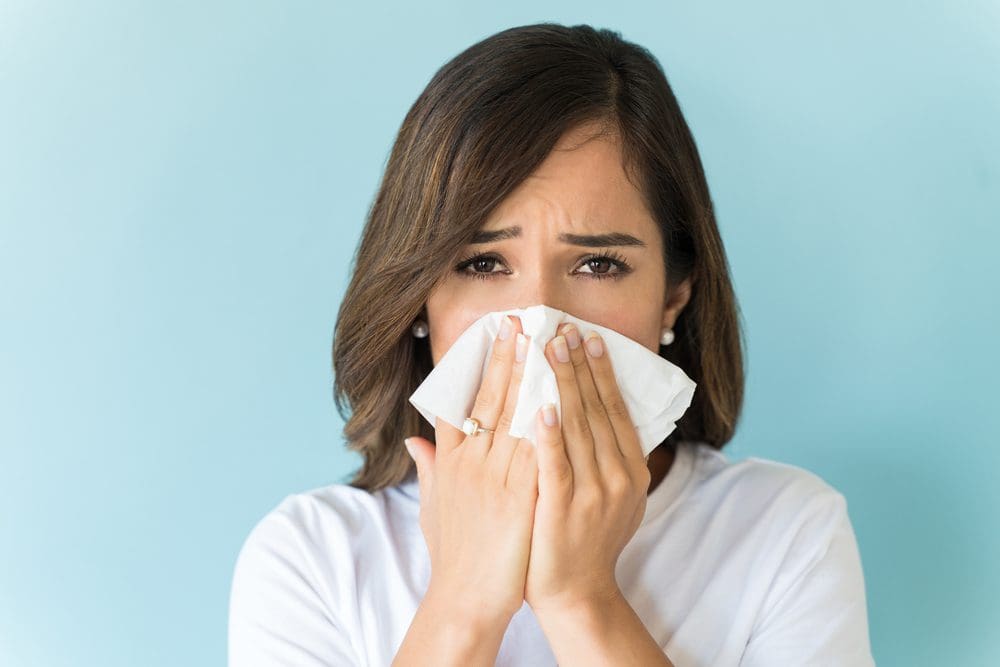Full Disclosure: Clicking on these links could mean a tiny commission for me, at no extra cost to you.
Allergies affect more than 100 million people in the U.S. every year. For many, these allergies can have a significant impact on their mental health. From depression and anxiety to other mood disorders, the effects of allergies can be far-reaching. These effects are well-documented in various studies, although there has been no clear evidence demonstrating that allergies alone can cause mood disorders. Thankfully, there are ways to manage your allergies and take steps toward reducing their impact on your mental health, including avoiding exposure, using allergy medications, and starting allergy immunotherapy.
What Are Allergies?
Allergies are reactions in the body to a foreign substance called an allergen, such as pet dander, pollen, or bee venom. When your body comes into contact with the allergen, your immune system produces antibodies, blood proteins that counteract a specific antigen, that flag it as harmful.
This triggers a chain reaction, releasing chemicals that result in allergic symptoms. Your symptoms may vary, ranging from something as mild as a runny nose or itchy eyes to difficulty breathing or anaphylaxis, a severe and potentially life-threatening reaction.
Allergies are often hereditary, so if your family members have them, you develop them, too. They usually appear in children, although they may appear at any age.
Allergies and Your Mental Health: A Closer Look
Allergies can have a significant impact on your mental health. Considering that the symptoms can affect your sleep, energy levels, productivity, and mental sharpness, it’s no surprise that they can have far-reaching effects on your mental health.
Various studies have examined the correlation between different allergies and mental health. For example, one such study found that individuals with allergic rhinitis are associated with a higher risk of anxiety. Another study suggests that those with allergies are approximately 1.5 times more likely to experience major depression, especially women.
How Allergies Can Affect Mental Health
The Role of Inflammation
Experts believe that inflammation is also partially to blame for the problem. Allergic rhinitis is a chronic inflammatory disease, so when exposed to an allergen, your immune system releases a host of substances that trigger inflammation throughout your airways and brain.
Cytokines, proteins the body uses to fight specific infections, are released alongside other substances in an army that trigger the inflammation. These cytokines affect areas of the brain associated with depression and anxiety, which contributes to why your allergies make you feel the way you do.
It is impossible to see clear evidence of this in humans, but researchers have demonstrated it in a study involving mice and rats. The study discovered that exposure to allergens was related to an increase in the production of cytokines in the brain, signs of anxiety, and higher levels of a stress hormone.
Tips for Managing Your Allergies to Improve Your Mental Health
Avoid Exposure to the Allergen When Possible
Ideally, you would be able to completely avoid exposure to whatever allergies trigger a response in your body. However, since controlling outdoor and public environments is tricky, doing this can be nearly impossible. So, instead, it’s best to try to avoid the allergen whenever possible.
For example, if you have seasonal allergies, stay inside when it’s windy and keep your doors and windows shut to prevent pollen from breezing in and ruining your day. Or, if you have a pet allergy, try to avoid areas where they usually reside, even if the pet isn’t in the room.
While this method isn’t foolproof and may not always be possible, it can go a long way in helping you keep your allergies in check.
Use Allergy Medications
There are various types of allergy medications available, each designed to help manage the symptoms of an allergy, including decongestants, antihistamines, and corticosteroids. Talk to your doctor to determine what options are best for you.
When you know you’ll be exposed to the allergen and can’t avoid it, use the allergy medication your doctor recommends to help manage it. This method isn’t foolproof, either, and only focuses on the symptoms, not the allergy. Because of this, you’ll only get temporary relief from your allergies. That said, these medications can be a handy addition to your allergy management toolkit.
Consider Allergy Immunotherapy
If you’re looking for a long-term solution to your allergies, allergy immunotherapy (AIT) might be a suitable fit. Immunotherapy for allergies is designed to help reduce your body’s sensitivity to a particular allergen through repeated, long-term exposure.
It works by administering a small dose of the allergen to your body, usually via an injection (immunotherapy allergy shots) or tablet placed under the tongue (sublingual immunotherapy). This allergen exposure allows your immune system to become accustomed to it and, over time, “trains” your body to become less sensitive.
With time and repeated exposure, you may notice your allergies improve significantly or even disappear altogether. Most people begin to notice results within the first year, although it can be different for everyone. The best results usually show up in years two and three.
Allergies and Mental Health: In a Nutshell
Allergies can have a significant impact on your mental health, contributing to anxiety, depression, and similar mood disorders. While no evidence shows allergies alone cause mood disorders, researchers have found a clear connection between the two. It can be frustrating and overwhelming to deal with allergies, especially when they have such a profound impact on your mental health.
Luckily, there are ways to manage it. Avoiding exposure and employing allergy medications are excellent short-term options, but allergy immunotherapy might be a good option if you want a long-term solution. Talk to your healthcare provider to determine whether allergy immunotherapy is right for your needs.









